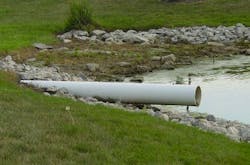Beazer Homes settles stormwater violations in 21 states for $925,000
Beazer Homes USA, Inc., a national residential homebuilder, has agreed today to pay a $925,000 civil penalty to resolve alleged Clean Water Act violations at its construction sites in 21 states, the Justice Department and U.S. Environmental Protection Agency (EPA) announced. As part of the settlement, Beazer will also implement a company-wide stormwater program to improve compliance with stormwater runoff requirements at current and future construction sites around the country.
“Contaminated stormwater puts children and families at risk as it may carry pollutants, including sediment, debris, and pesticides that contribute to water quality problems. These pollutants affect our nation’s rivers, lakes and sources of drinking water,” said Cynthia Giles, assistant administrator for EPA’s Office of Enforcement and Compliance and Assurance. “Today’s settlement will help protect public health and the environment by requiring Beazer to meet the requirements of our nation’s environmental laws and improve its oversight of its construction facilities.”
A portion of the settlement helps EPA efforts to protect the Chesapeake Bay, North America’s largest and most biologically diverse estuary. The bay and its tidal tributaries are threatened by pollution from a variety of sources, and overburdened with nitrogen, phosphorus and sediment that can be carried by stormwater. The settlement will result in a reduction of approximately 10.4 million pounds of pollutants to the bay watershed.
“This settlement will help many communities across the nation by protecting their waterways from harmful pollutants in stormwater runoff,” said Ignacia S. Moreno, Assistant Attorney General for the Environment and Natural Resources Division of the Department of Justice. “Contamination from runoff can be easily prevented, and those who do not take the necessary measures face the prospect of enforcement action under the Clean Water Act.”
The government complaint, filed simultaneously with the settlement agreement in federal court in Nashville, alleges a pattern of violations that was discovered through site inspections and by reviewing documentation submitted by the company. The alleged violations include failure to obtain permits until after construction began, or failing to obtain them at all. At sites with permits, violations included failure to prevent or minimize the discharge of pollutants such as silt and debris in stormwater runoff.
The settlement requires Beazer to develop improved pollution prevention plans for each construction site, conduct additional site inspections, and promptly correct any problems detected. The company must properly train construction managers and contractors and designate trained staff for each site. Beazer must also implement a management and internal reporting system to improve oversight of on-the-ground operations and submit annual reports to EPA.
The Clean Water Act requires that construction sites have controls in place to prevent pollution from being discharged with stormwater into nearby waterways. These controls include simple pollution prevention techniques such as silt fences, phased site grading, and sediment basins to prevent common construction contaminants from entering the nation’s waterways.
Keeping contaminated stormwater out of America’s waters is one of EPA’s national enforcement initiatives. Construction projects have a high potential for environmental harm because they disturb large areas of land and significantly increase the potential for erosion. Without onsite pollution controls, sediment-laden runoff from construction sites can flow directly to the nearest waterway and degrade water quality. In addition, stormwater can pick up other pollutants, including concrete washout, paint, used oil, pesticides, solvents and other debris. Polluted runoff can harm or kill fish and wildlife, degrade aquatic habitats, and affect drinking water quality.
This settlement is the latest in a series of enforcement actions to address stormwater violations from construction sites around the country. In the last several years, EPA and DOJ have reached consent decrees with nine residential construction companies for stormwater violations resulting in approximately $6.3 million in penalties.
Seven states have joined the settlement. The states of Colorado, Florida, Indiana, Maryland, Nevada, and Tennessee, and the Commonwealth of Virginia will receive a portion of the $925,000 penalty.
The consent decree, lodged in the U.S. District Court for the Middle District of Tennessee, is subject to a 30-day public comment period and approval by the federal court.
For more information, visit: http://www.epa.gov/compliance/resources/cases/civil/cwa/beazer.html
